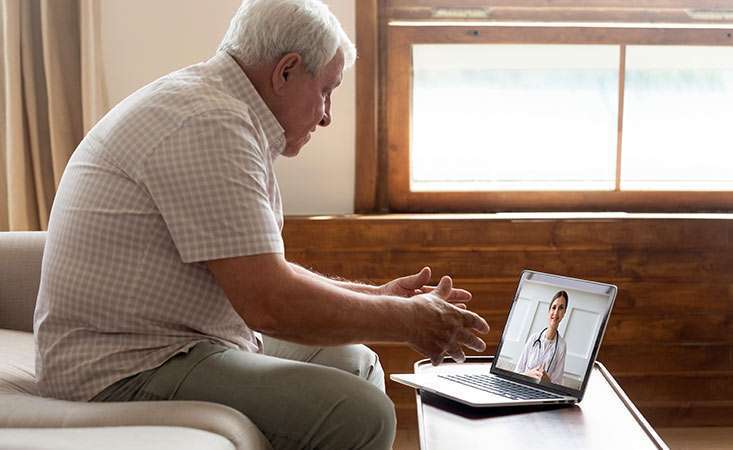
Editor’s note: Please continue to follow the U.S. Centers for Disease Control (CDC) for up to date information and guidelines about coronavirus disease (COVID-19) and pay attention to policies and restrictions specific to your state or region as they are constantly evolving. Please also speak with your healthcare team for personalized information and instructions.
Below we provide some general advice and suggestions but stress that little is currently known about COVID-19. Therefore, all health-related questions should be discussed with your doctor and/or care team.
The global pandemic of coronavirus disease (COVID-19) can create a lot of questions in people’s minds, especially those considered at higher risk for being affected by the disease.
Below is a Q&A with Joseph Herman, MD, MSc, MSHCM, the Pancreatic Cancer Action Network’s (PanCAN) interim chief medical officer, answering some frequently asked questions about COVID-19 and pancreatic cancer.
1. What is coronavirus disease (COVID-19)?
Coronavirus describes a family of viruses that can affect humans and animals. This family of viruses is responsible for the common cold, as well as more severe diseases such as SARS (severe acute respiratory syndrome) and MERS (Middle East respiratory syndrome).
More specifically, the current coronavirus has been named “SARS-CoV-2.” The illness the virus causes is COVID-19, which stands for “coronavirus disease 2019.” COVID-19 is the name of the disease, not the virus.
This specific virus has not been seen by humans before, and therefore our immune system is not able to mount a response as quickly or effectively. This can result in more severe symptoms. This is especially dangerous for older adults, those who are immunosuppressed or people with diabetes, heart or lung issues.
The symptoms of COVID-19 typically include fever, cough and shortness of breath. Symptoms can range from mild to severe, and complications can be more serious in people with the risk factors described above.
2. Are pancreatic cancer patients at a higher risk for COVID-19?
There is still a lot to learn about how COVID-19 affects different populations. One thing that’s known is that it has a worse effect on older people, and about two-thirds of pancreatic cancer patients are at least 65 years old.

Joseph Herman, MD, MSc, MSHCM
Also, since there is a higher likelihood of pancreatic cancer patients having diabetes, and because there may be a higher risk of COVID-19 in people with diabetes, it’s important to make every effort to keep your diabetes controlled.
Patients who are actively receiving chemotherapy or radiation therapy may have a weaker immune system and may be more susceptible – but, again, we don’t know for sure. Patients recovering from surgery may also be at an increased risk.
For those concerned about their risk, it’s important to limit exposure to anyone who has been sick in the past few weeks or has recently traveled or used public transportation.
In general, limit exposure to others as much as you can and travel only if it is absolutely necessary.
3. If a pancreatic cancer patient starts experiencing symptoms of COVID-19, what should they do?
Per CDC guidelines, if you think you have been exposed to COVID-19 and develop a fever and symptoms, such as cough or difficulty breathing, call your healthcare provider for medical advice.
This is especially the case if you develop these symptoms while you are actively on treatment for your pancreatic cancer, are immunosuppressed or have other serious medical conditions.
At this time there is no “right” answer, and it is best to still contact your care team and/or primary doctor and ask for further direction.
If there is a “virtual” or phone option to get in touch with a healthcare professional, that would be ideal if you have mild symptoms. They can counsel you on whether you should go to the emergency room or doctor’s office, where you could risk additional exposure. It is important to mention that the symptoms can get worse rapidly, and therefore this decision should be made with the advice of your doctor or care team.
4. Should patients skip checkup or treatment appointments at this time?
Speak with your healthcare team about upcoming appointments to determine whether they advise you to cancel or postpone them. For example, if you are healthy and in regular follow-up (no active cancer), it may be best to postpone your checkup visit with your doctor until after the situation improves.
For patients who have upcoming surgery, chemotherapy or radiation therapy appointments, we recommend discussing with your healthcare team. The answer will depend on the individual and where they are in their treatment journey.
5. How can pancreatic cancer patients stay connected while socially distancing themselves?
It’s important for patients’ (and their caregivers’) mental and physical health to practice as much self-care as possible during this challenging time. That means trying to eat healthy, sleep well and get some exercise.
There are also ways to stay in close contact with loved ones, like FaceTime, Google Hangouts, Zoom and others, that can make you feel connected from a physical distance. Remember to reach out and check on your loved ones – especially those who are most vulnerable.
Additional reading on this topic:
CDC: Coronavirus (COVID-19)
FAQs About Coronavirus and Pancreatic Cancer: Part 2
PanCAN’s Response to Coronavirus Disease (COVID-19)
A Message from Our PanCAN CEO
Important Information Regarding PurpleStride Events and Coronavirus Disease (COVID-19)
















